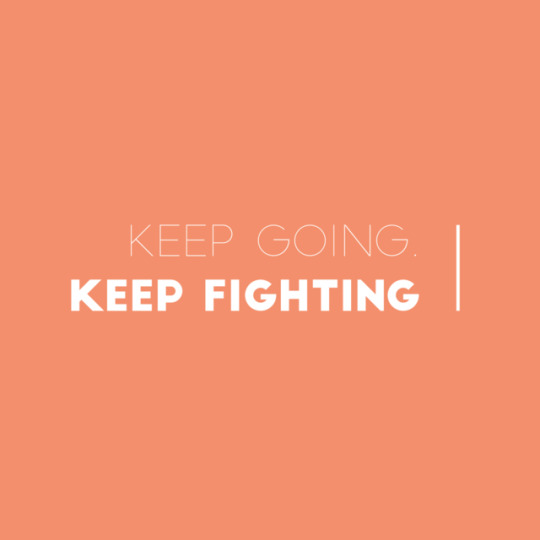artiem1250's studyblr | Class of 2017 | Aspiring Healer | Dank Memer | Rad and Responsible | Salty and Sweet
Don't wanna be here? Send us removal request.
Photo
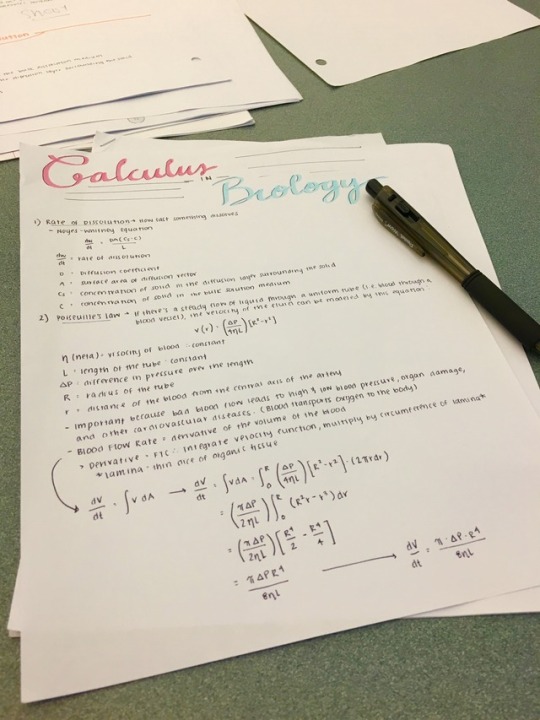
Taking notes on people’s Prezis. I liked my handwriting today, so I’ve decided to share it :)
(Also, my lettering won’t change anytime soon unless I find something I like even more lol)
6.12.17
4 notes
·
View notes
Photo

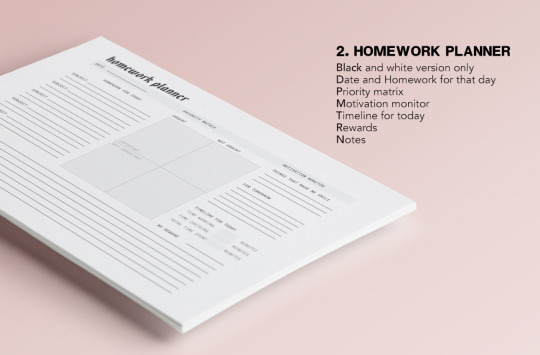
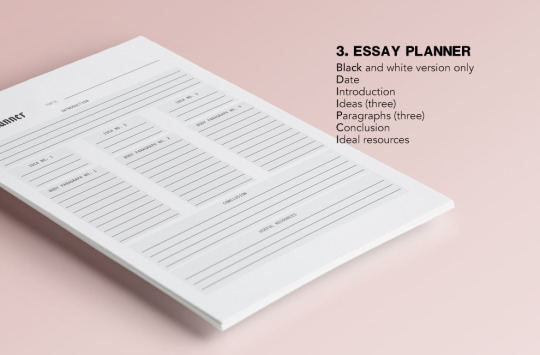
Printables: Homework, essay and project planners
Requested by @theatrebooknook
These ones took a while but I think it was worthwhile. Thanks for waiting.
Download in my dropbox studyblr folder.
* * *
Remember I’m presently working only with requests, instead of publishing random printables. If you have any suggestion or commentary, be sure to ask in my inbox. Have a nice week!
(Tagging mutuals, blogs I like shamelessly, etc)
@neko-with-roses @hazie @studyang @eliotwghs @alicewahlbrewer @helstudies @diyaanat @gardenstudy @carriefishervevo @i-speakcoffee @lawrelcrowns @study-bunni @ari6nna @studysheet @annistudio
18K notes
·
View notes
Photo
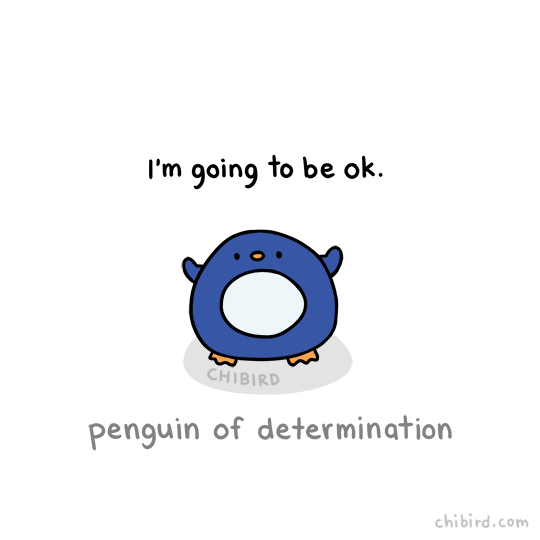
Have this chubby penguin of determination to inspire you!
9K notes
·
View notes
Photo
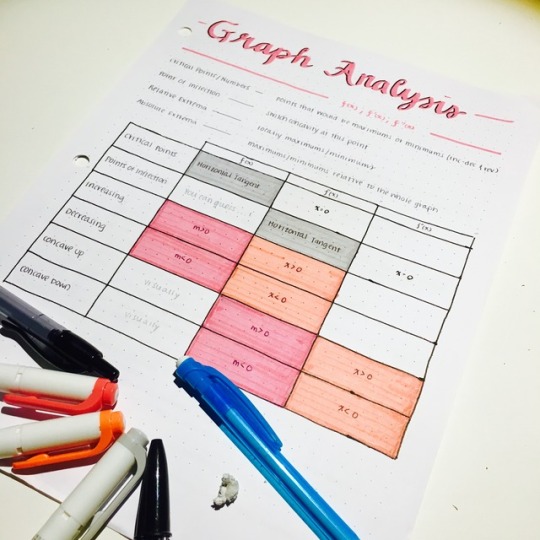
It’s been a while... :)
It’s never too late to organize old information, right?
4.27.2017
8 notes
·
View notes
Text
How To Make Yourself Do What You Don’t Want to Do
1. Rather than listening to the voice in your head that is screaming “I hate this; I don’t want to do this” think about why it is a GOOD thing to do.
2. Instead of trying to pretend that you don’t feel this way, accept that you are feeling very blah and negative.
3. Don’t think about results and how well you think you’ll do, as this could raise your feelings of anxiety and fear, just think about “right now” and the first thing you can do.
4. Accept that life is tough, and is full of things that suck – but recognise that doing hard stuff is better in the end. You’ll likely have more choices and freedom, if you do.
5. Just do a little bit for now – then give yourself a proper break – then go back and do some more – and soon you’ll find you’re in the flow.
6. Don’t allow your mind to wander and think of other things. Stay focused for that short time – and then stop, and have fun.
18K notes
·
View notes
Conversation
nihilism: everything is meaningless
absurdism: everything is meaningless lmao
51K notes
·
View notes
Photo
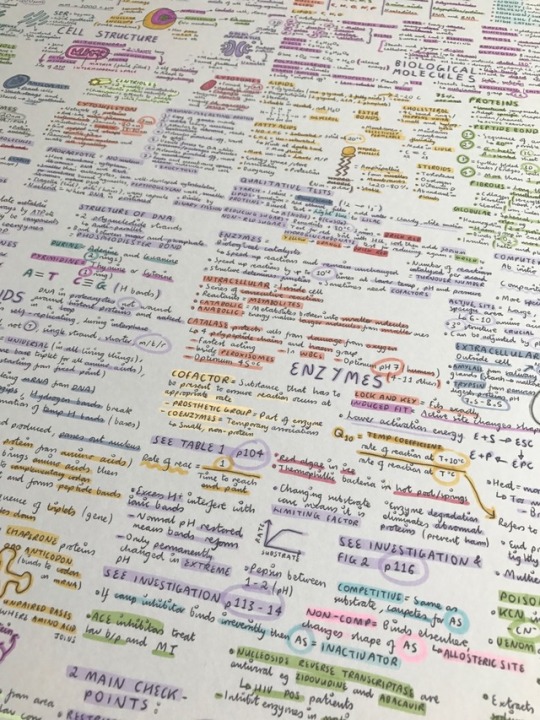
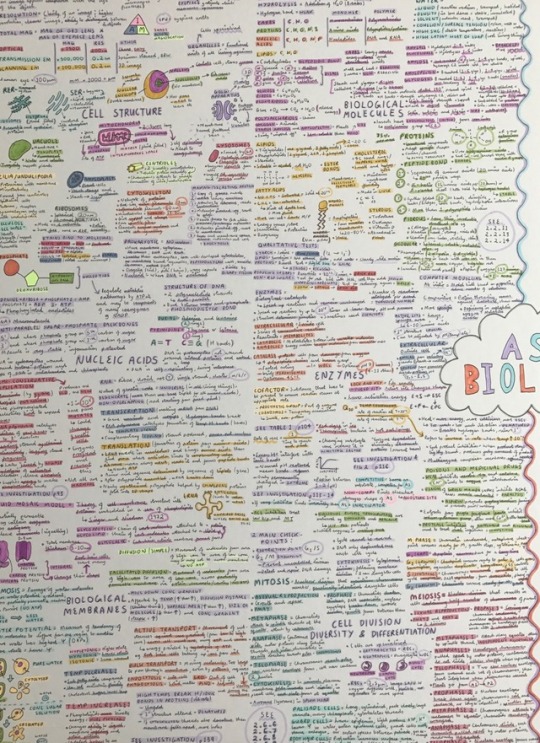
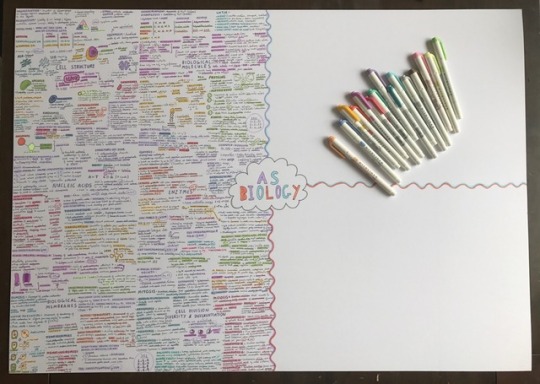
~ 13/04/2017 ~
I want to try and be more active on here/post more original content. So, have today’s ‘masterpiece’ haha! I have now half completed my AS Biology mind map/poster (onto A1 card). Module 2 = COMPLETE!!
So satisfying :)
2K notes
·
View notes
Photo
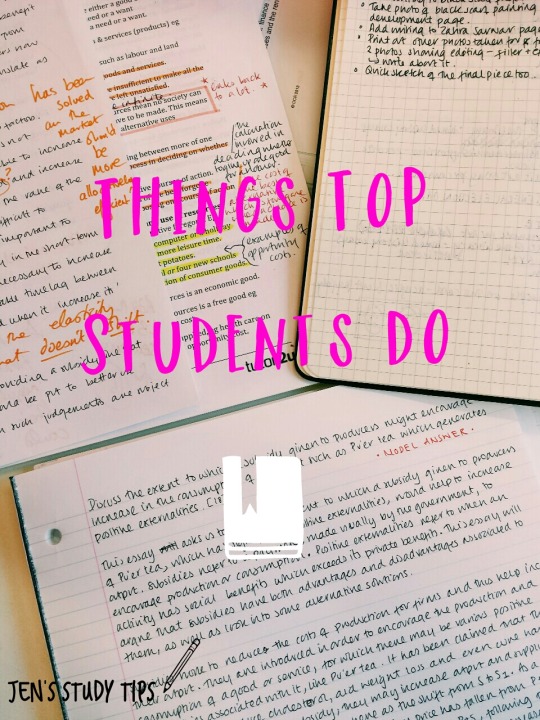
Things Top Students Do
1. They don’t always do all of their homework.
In college, homework assignments generally make up 5-20% of your grade, but can be the biggest time-suck for most students. Yes, working problems is one of the best ways to turn new concepts into working knowledge, but a large majority of those problems that take you hours and hours to work through, you’ll never see on an exam.
2. They never “read through” the textbook.
Per time spent, reading the textbook is one of the least effective methods for learning new material. Top students use the examples and practice problems, but otherwise use Google, lecture notes, and old exams for study materials.
3. They Google EVERYTHING.
It’s like an automatic reaction. New concept = go to Google for a quick explanation. Don’t think just because your professor gives you a textbook and some examples on the blackboard that you’re limited to that information. You have a massive free search engine at your fingertips, so make use of it.
4. They test themselves frequently.
Testing yourself strengthens your brain’s connections to new material, and gives you immediate and clear feedback on whether you know something or not. Bottom line, repeated self-testing significantly improves long-term retention of new material.
5. They study in short bursts, not long marathons.
Studying in short bursts tends to help you focus intensely because you know there is at least a short break coming.
This also fits in nicely with our Ultradian Rhythm, the natural activity/rest cycle of our bodies, which makes studying continuously for multiple hours on end counterproductive.
6. They reverse-engineer solved problems.
It’s one thing to follow and memorize a set of steps to solve a calculus problem. It’s an entirely different thing to understand what a derivative is, be able to take derivates of complex functions, know when to use the chain rule vs. the product rule, etc. The problem with simply following the steps the professor provided, or the textbook outlines, is that you’re only achieving a surface-level knowledge of the problem. Top students, instead,take solved problems and work backwards, from solution to question, asking “why.”
Why did this get this value? Why did they simplify this expression? Why did they use that type of derivative rule?
By following this process, you begin to understand the interconnections of the concept, and how to directly apply that to a problem. This “working knowledge” of a concept is key to performing well on exams, especially on problems that you haven’t seen before.
7. They don’t own a highlighter.
Highlighting anything = unengaged reading. If you want to note something that stands out, underline and write a corresponding note to go along with it. Or better yet, write yourself a note summarizing the item in your own words.
8. They sleep–a lot.
The daily routines of top performers, in any field, are characterized by periods of intense work (4-6 hours per day) followed by significant quantities of high-quality sleep (9 hours per night). You see this trend in top violin prodigies and chess champions, as well as elite athletes. The idea is to alternate periods of intense work with rest, so that you create tons of new connections in your nervous system, and then allow adequate time to assimilate those gains.
9. They engage themselves by asking questions.
What happens if I tell you, “Thomas Jefferson almost single-handedly drafted the Delcaration of Independence in 1776.”?
You might say “Hmm.. that’s interesting”, try to remember it for later, maybe even write down a note or two.
But what if I ask you, “Who was Thomas Jefferson?” What changes?
You start searching your memory, sifting through images of old guys, founding fathers, thinking about the Declaration of Independence. You come up with your own narrative, and then realize that you have gaps.
When was he around again? And why was he so important?
You’ll probably find yourself going to Google to fill in the gaps. Through that process your learning will be much more deeply seated in your brain than anything your history teacher ever told you about him. That’s the power of asking questions.
10. They make the best out of lecture.
Yes, your professor sucks. Yes, lectures are boring. Yes, it’s either too fast so you can’t keep up and miss all the important stuff, or it’s way too slow and you start zoning out because you already understand everything.
The best students look at this this way: I’m going to be there no matter what, so what’s the best use of my time while I’m in the classroom? Ask questions, bring the textbook and look stuff up, focus on the important practice problems to copy down in your notes, try to anticipate what the professor is going to say, make note of anything they put emphasis on as a potential exam topic. All of these things make the time you have to spend in lecture more productive and engaging. And that’s less time you have to spend studying later on.
11. They over-learn.
School is hard enough, with the amount of studying and homework you have to do. And on top of all of that Facebooking you have to get done? It might seem ridiculous to suggest learning more than you have to.
What!? Are you insane!?
But this is precisely what top students do. And paradoxically, they end up spending less time trying to understand how to do homework problems, andless time studying for exams because of it. Because when you “over-learn” past what’s presented in class, you build a better framework for the subject.
Think of trying to remember some details about Abraham Lincoln’s life. You try to remember the dates of the Civil War, or what he said in the Emancipation Proclamation. You study the same facts over and over and over again… but it’s just boring, and you quickly forget. But what if you knew his whole life’s story? About how Lincoln suffered from bouts of depression, and his relationship with his wife suffered? You start to learn that the dude was human, and you start to relate to the things he did and the struggles he went through. Now you’ve constructed a story in your head. And studies show that humans learn best through stories. So yes, it’s more information, but your brain knows what to do with it now that all those random facts are linked together. More learning, but less rote memorization and struggling to remember random facts.
12. They immediately study their exam mistakes.
Most students get their exam grade back, flip through to see if the professor made any mistakes they can argue about, and then promptly shove it into their notebook, never to be seen again until the mad scramble at the end of the semester to study for the final.
Instead, top students ignore what they got right, and use their mistakes as an indicator of what to improve on.
13. They’re busy with work and side projects.
Yes, to do well in a course, you need to focus and put in the hours. But like many geniuses throughout history have shown, involvement in a diverse set of subjects, activities, and skill sets keeps you active, and provides you with a rich and diverse set of mental models to pull from.
Also, as they say, “If you need to get something done, give it to the busy person.” If you stay active in multiple areas, you don’t have time to procrastinate, and are forced to be efficient with your study time. This generally translates into quicker learning and better performance throughout the semester.
14. They use lecture as a detective mission.
Though completely unaware of this fact, your professor has tells. Yes, like in poker. Tells during lecture will hint at particular types of concepts and problems that will be emphasized on the midterm or final exam. The best students pay attention to topics professors spend a seemingly inordinate amount of time on and make note. Chances are you’ll see something related on the final.
15. They don’t wait for motivation to strike.
Motivation comes and goes, but studying for a degree requires persistence and consistency. Just like Olympic athletes train even on their worst days, the best students figure out how to get their coursework done when it’s the last thing they want to do.
16. They practice under test conditions. The old adage “practice makes perfect” isn’t totally true. Deliberate practice under the right conditions, with the correct mindset, is more like it. Instead of reading through all of the lecture notes and redoing old homework problems, top students make themselves practice exams, and rehearse their exam performance, under time pressure and in similar conditions (no notes, uncomfortable chair, quiet room, etc.) to what they’ll see on test day.
17. They use old exams.
Professors aren’t the most inventive folk. Along with coming up with lecture material and departmental responsibilities, they’re also primarily concerned with research. So typically midterms and final exams more or less look alike for similar courses year-to-year and even across universities. Because of this, old exams are a gold mine of opportunity for figuring out what problems you should be able to solve and study from.
18. They make their own study guides.
The best students don’t simply use the study guide the teacher provides, they create their own.
Creating the study guide is half the battle, requiring you to go through your notes, consolidate them, and organize them in a way that you understand–all valuable study activities. You’ll also be able to use your equations sheet much more effectively on the exam itself (if allowed) because you know exactly where everything is.
19. They actually write on paper.
Writing out notes on a laptop is efficient. Too efficient. Because it’s so easy to quickly type out exactly what the professor is saying, you don’t have to do the work of trying to figure out how to consolidate the information into your own shorthand. Some also believe that the act of writing helps retain more information.
20. They use the 80/20 rule.
Yes, some students who get good grades do every reading assignment, finish every practice problem, and attend every study session they can get their hands on. But these students are missing the point. There will always be an endless amount of information you could learn given the time and effort, but having the ability to discern what is worth learning will truly set you apart.
Top students identify the 20% of concepts they need to learn deeply, in order to determine 80% of their final grade. They focus intently on those few things, and simply ignore the rest. This is a formula for high performance, without hours and hours of busywork. And it translates seamlessly into the real world too.
21. They don’t complain.
Complaining simply has no place in the smart student’s repertoire. If something sucks, change it or ignore it, but don’t waste your time, energy, and mental state talking about it. Got a crappy professor? Either switch class sections or focus on teaching yourself. Horrible textbook? Find alternate resources (Google is free in case you hadn’t heard).
22. They learn by doing.
Any technical subject can only truly be internalized through use. Just like learning a new language, learning to be fluent in algebra or calculus requires active application of rules and formulas. Top students know there is a big difference between knowledge, and applied knowledge.
23. They take personal responsibility for learning the material.
The best students understand that they, and only they are truly responsible for their own education. So waiting to be spoon-fed by your professor and doing the homework assignments will never be enough. Despite your school’s best intentions, they’ll never be as committed to your academic success as you can be.
24. Following what they love
Those students you admire are passionate about what they are learning. They have the drive to develop their learning further based on their love of what they are discovering. This may not always be the case and is often unavoidable but if you follow what interests you and cultivate a curiosity of this area, your motivation to learn will thrive.
Not every student is the same and many top students don’t follow the status quo. The best way to create good habits for students is to try a variety of techniques and figure out what works for you.
25. Question your teachers Thinking outside the box is a cliche but certainly a reality for students. They question everything–especially test questions they get wrong. This attitude is important because it shows a general inquisitiveness that is essential in learning. As any parent of small children knows, questions are a way to gain knowledge. Teachers can’t be offended when a student asks a difficult question and parents should encourage this behavior.
26. They know the best way to study.
It is important to know the best way to study for yourself. Do you need pictures? Sounds? Study better in quiet or noisy environments? Figure out what works best for you so that you can make the most out of your study time.
27. They play hard.
We all know that a balanced lifestyle is the best way to stay mentally and physically healthy! Top students don’t spend all day in the library grafting (contrary to what you might think!) Rather, they take the time to put their studies aside and do something which is fun and exciting!
Source : 1 2 3 4
53K notes
·
View notes
Photo


Quote of the day: It’s okay, you can always try again 🌼
5K notes
·
View notes
Photo

I got a request to make a masterpost on motivation, but I decided to focus on the bigger issue that makes us constantly need motivation: burnout. Doing work when you’re motivated is great - you’re focused on determined. Waiting for the motivation to hit you is a different story all together. What if instead of waiting for motivation to hit you, you learn to find it within yourself?
Avoiding Burnout
you know that feeling you get when you have the flu and you just can’t get your ass out of bed no matter how hard you try? that’s how your brain feels when you’re burned out. You’ve got so much to do but you just can’t get yourself to do it and you just don’t care about school/work/grades anymore. Burnout is linked to depression, so if you are feeling any other symptoms of depression, please talk to a counselor or therapist.
some tips I’ve picked up along the way:
stay on top of your shit. If you know what to do and what you have coming up, you can afford to take time off for yourself if you need it. A little turbulence is better than crashing and burning. (I made a post on time management a few days back if you want to check it out)
your needs come before anything else. If you’ve been working hard for the past few days, take a few days off and relax. Even if you haven’t been working hard for the past few days, take a day off if you need it.
break up daunting tasks into multiple not-so-bad small ones. Have a giant research paper due at the end of the semester? plan out your work so you don’t end up spending 15 hours working on it in one day.
find a hobby and make time for it at least once a week. One of the biggest stress relievers for me is painting. It keeps my brain occupied so I’m not overwhelmed by my thoughts, but it also frees up some space for me to think about what’s going on my life. It’s like the brainstorming you get done in the shower.
brain dump before you start working. Getting everything that’s in my mind out of it makes it so much easier for me to focus on the work I have to do. Instead of worrying about 10 different things, I tell myself that I can deal with them later because this way I make sure I don’t forget about it.
create a support system. Have that one person you can rant to if you’re overwhelmed (If you need one, I am here). You will feel 10x better after you bitch about all the things that are on your mind (no matter how stupid they are).
Find motivation that doesn’t really on that “spark” you get every once in a while. Riding that wave will only take you so far. Finding intrinsic motivation will help you learn better and consequently, do better.
Check out this gr8 pdf to learn more burnout and strategies to avoid it
Finding Intrinsic Motivation
There’s a great TED talk called the Puzzle of Motivation by Dan Pink that completely change my perception of motivation. He talks about extrinsic motivation (reward systems) and how they actual prevent us from thinking critically. Instead of focusing on our overall goal (getting a good grade in the class) we focus on getting the reward (finishing the assignment so we can get whatever we promised ourselves). Studies actually showed that intrinsic motivation increased the amount of critical thinking involved. Interesting stuff. There’s a whole field of psychology dedicated to this, but I’m going to try my best to condense the research into a few bullet points.
Remember why you are here. Your education is a choice, not a requirement. If you’re reading this, you obviously what to do well. Why do you want to do well in school? To get into college? To get a good job? Money? Whatever the purpose is, you are here for a reason. Don’t forget it.
Negative reinforcement is your friend. If your goals can’t keep you motivated, think about what will happen if you don’t get your work done.
The biggest key to getting your work done even if you’re not motivated is discipline. Here’s a great post about developing discipline (sorry for linking it on my blog, it seems the original post has been deleted)
Other helpful links
motivation masterpost by @areistotle
avoiding burnout by @acdemic
study music to give you motivation
dopamine-rich foods (to help keep you attentive)
managing studying with mental illness by @kawaii-geekgirl-studyblr
how to study with a mental illness by @haleystudies
how to get motivated when you’re feeling depressed
my tag for motivation
my tag for some gr8 study playlists
my tag for some words of inspiration
if all else fails, please go talk to your teachers/professors/counselors. they are here to help you and they want you to do well.
4K notes
·
View notes
Text
cringing aggressively please dont look at my oc it’s BANned you will get wrinkles in 2 years!!!
0 notes
Photo


Take control. You’ll be able to do anything.
108 notes
·
View notes
Photo

Guide to Self-Studying Japanese
A large proportion of Japanese learners self-study. Finding places to learn Japanese in a classroom environment can be difficult and expensive. Here’s a guide on how you can learn Japanese for free and from the comfort of your sofa.

When learning Japanese, the most important step is to learn Hiragana and Katakana, the writing alphabets of Japanese.
The best way I’ve found to do that is to make flashcards. Make sure you practice writing as well as recognizing them, this will not only be a great skill to have but will also reinforce the shapes in your mind.
Resources:
[Hiragana 42], the best guide I’ve found to learn the Hiragana (in a day!) [Hiranana and Katakana Quiz Site] [Kana Invaders Game] [Anki] An amazing program that will make sure you never forget any Kana….

The next step is to start learning vocabulary. Where can you find what to learn? Use a site like Memrise to find word lists (for example, there is a word list for all the vocabulary in starter textbooks like Genki), and use the amazing interface to learn them and keep them in your long term memory.
Resources:
[Memrise] as mentioned above to find and learn vocabulary lists. [Most Common Words List] [Anki] An amazing program that will make sure you never forget any Vocabulary….

While encountering vocabulary, you’re likely to be coming across super-complicated-looking Kanji. You can learn Kanji through Memrise as above, but there are some other websites that may be of interest.
Resources:
[Kanji Damage] A great site where you can learn Kanji through mnemonics. [WaniKani] by the same people who make TextFugu can help you learn Kanji from scratch. [Anki] An amazing program that will make sure you never forget any Kanji….

The next step is to apply that new vocabulary to grammar points and start making sentences.
If you can’t get your hands on textbooks like Genki, don’t fear! There are a lot of great online grammar resources.
Resources:
[TextFugu] a highly rated ‘online textbook’ which will guide you right from the beginning of learning Japanese. [Guide to Japanese] another online textbook with a lot of grammar points and excellent explanations.

So you probably started to learn Japanese because you have some interest in Japanese media. Time to start using it to your advantage!
Aside from the obvious watching Anime, J-dramas and films, why not try Reading Japanese News? Watching Japanese TV? Just make sure you are making these activities productive - note down new vocabulary, add them to Anki, and keep learning! It’s much easier to learn things you’re interested in.

The most important but difficult part of self-studying Japanese is getting your own compositions checked. Utilize all that grammar and vocabulary and write a short piece, it could be a diary entry or a short essay. Get it recorded for you by a native on RhinoSpike, and checked for grammar and consistencies on Lang-8.These sites also give you the chance to connect with Japanese natives, and perhaps start up some language exchanges!
For more resources, take a look at my Ultimate Resources List

Any more tips? Please submit them here!
130K notes
·
View notes
Photo










Illustrations for the Uppercase Planner by Simini Blocker on Tumblr
More like this
46K notes
·
View notes
Photo
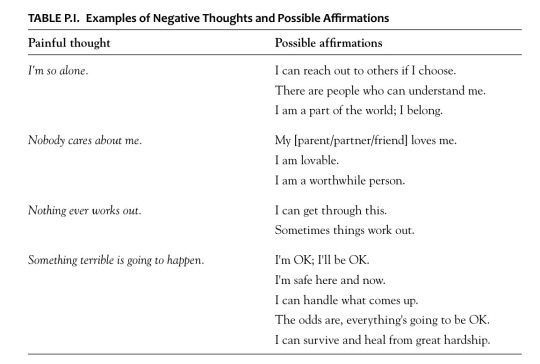
Life After Trauma 2nd Edition
51K notes
·
View notes
Text
Are fedoras really that bad?





YES YES THEY ARE
3M notes
·
View notes



